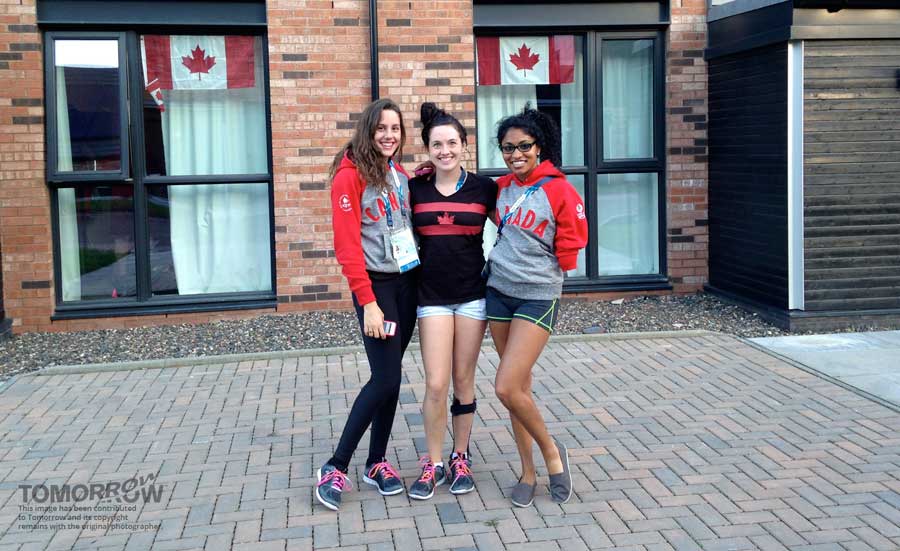
Canadian para swimmers (l to r) Aurélie Rivard, Morgan Bird and Katarina Roxon at the Glasgow 2014 Commonwealth Games. Photo courtesy Morgan Bird.
Four countries, two major competitions, one month – this past summer was another perfect reminder that I cannot get too comfortable in one place for too long.
Living out of a suitcase is something I have become used to and learned to love. Travel is nothing new to me. Since the beginning of my swimming career on the Canadian para national team, my yearning for adventure has grown stronger.
This summer was no different, except for one thing: the inclusion of para swimmers into the able bodied competition.
This does not mean that para athletes have to race against able-bodied athletes. Instead, para athletes race against other para athletes with similar limitations, which are interspersed with able-bodied races during competition.
The first half of the trip included Sabadell, Spain, for staging camp to prepare for competition and Glasgow, Scotland, for the Commonwealth Games.
In Glasgow, I was one of three para swimmers to represent Canada. Interspersing para and non-para had never been done on this scale before, and in my opinion was a huge step in the right direction.
In the past, advocating for para swimming has proven to be quite difficult, as information on it is very sparse and hard to find. As a para swimmer, I am used to going to major international competitions where there are solely para swimmers competing. It is “normal” to see prosthetic limbs and wheelchairs all over the place. Not only that, but it is also very common to see swimmers cruising through the water with just their torso, or finishing a race by slamming the wall with just their head.
It is with breakthroughs like those at the Commonwealth Games for inclusion and media attention that we will see the para side getting the interest and awareness that it deserves.
The second half of the trip included a quick return to British Columbia in Canada for another staging camp before Pasadena, California, for the 2014 Pan Pacific Para-Swimming Championships. It was nice to get back on home soil for five minutes before heading off to the biggest competition of the summer in the US.
This competition was para only, and athletes as well as spectators from all over the world attended. If a city is seriously considering hosting an International Paralympic Committee (IPC) sanctioned event, they have to have appropriate accommodations, such as wheelchair ramps and spacious changing rooms in order to have room for those with limited movement. I have been at some meets where the accommodations have been great, and others where they needed improvement. They were very good in Pasadena.
Being able to race in an international competition is one of the best atmospheres you can put yourself in. At Para Pan Pacific Championships, it was Team Canada’s goal to return home with 25 podium placements. We surpassed that with a total of 62 medals by the end of the meet.
The summer ended with some excellent results and an abundance of memories made with such good friends, and I cannot wait to do it all again next time. I will always consider it an honour to represent my country, and will always sport the maple leaf with pride.

